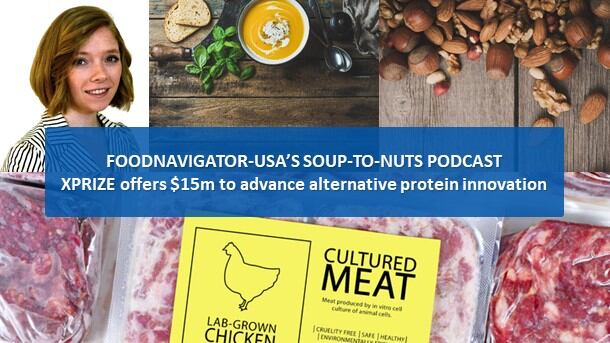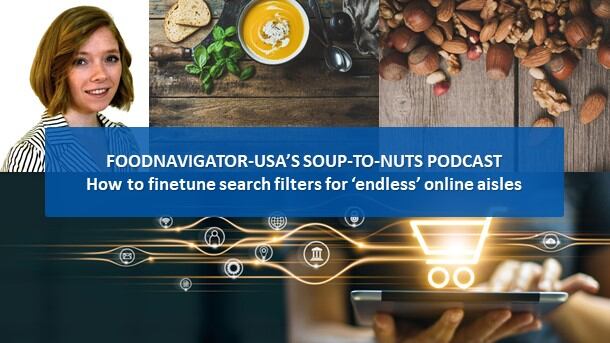Launching today, XPRIZE’s Feed The Next Billion competition aims to “revolutionize the global food supply chain and its impact on communities around the world” by helping to fund development of chicken and fish alternatives at a scale and price point that will ensure “equitable access to high-protein, nutritious, quality food that allows everybody to live active and healthy lives.”
Over the next four years, XPRIZE judges will evaluate and fund teams’ abilities to consistently create meat alternatives that look, taste, smell and perform the same fish fillets and chicken breasts without sacrificing nutrition and with a lower environmental footprint than their comparable conventional counterparts.
XPRIZE food scientist MJ Kinney joins this episode of FoodNavigator-USA’s Soup-To-Nuts Podcast to share more about the competition, including the extent of the problem it is designed to address, what inspired its launch, how judges will evaluate applicants and the potential impact that an infusion of $15 million over four years could have on the alternative protein sector and food industry as a whole.
[Editor’s Note: Never miss another episode of FoodNavigator-USA’s Soup-To-Nuts podcast – subscribe today.]
Meeting demand with limited resources
The competition, which will accept applications today, Dec. 7, through April 28, 2021, comes when demand for protein is surging due to a growing population, rising disposable incomes globally and food insecurity fears due to the COVID-19 outbreak. At the same time, Kinney notes meat shortages related to the pandemic, climate change and supply chain constrains underscore the limitations of the meat industry and the need for alternatives.
“Meat production practices, animal agriculture is in no way, shape or form and optimal, sustainable” option for long term food production, Kinney said. “When we look at it right now, a population of about 7.6b people globally, set to be 9.7b people by the year 2050, where things are right now 50% of all available land is being utilized by animal agriculture and 70% of available. These numbers alone don’t support a future … when our population increases by 30% over the next 30 years.”
Kinney also notes that the timing is right for the competition given rising consumer interest in plant-based proteins and products that closely their animal counterparts, as well as their increasing acceptance of the idea that meat can be produced without animal slaughter.
In addition to needing increased ingredient diversity, Kinney notes that for alternative proteins to effectively compete against and even replace animal-based proteins, they need to be available in a variety of forms from red meat to poultry to seafood.
The inspiration for XPRIZE’s Feed The Next Billion competition
The idea for the challenge and need to accelerate alternative protein production also is validated by XPRIZE’s Future of Food Impact Roadmap, which was released last year to chart a path toward a world where people have sufficient, nutritious, affordable food; where the food system supports fair economic opportunity across the value chain; and where the environment is restored, rather than degraded, by food production.
The 130-page report, which Kinney describes as “beautifully curated,” calls for “disruptive innovations” to address three “grand challenges” facing the food system and our ability to feed a growing population. These include consuming and producing healthier food, creating inclusive food supply chains and managing food systems within environmental limits.
To overcome these challenges, the report outlines 12 breakthroughs or discoveries that can significantly and sometimes dramatically change the trajectory of the future. Kinney notes several of these breakthroughs inspired XPRIZE’s Feed The Next Billion competition by underscoring the need for and potential impact of chicken and fish alternatives compared to other protein options.
Among these are land use revolution, ocean and land biodiversity stewardship, alternative and novel protein production at scale – including from fungi, bacteria, yeast and animal cells – and an evolving acceptance of new food norms.
Accelerating change
Companies interested in capitalizing on consumer interest in alternative proteins and securing a portion of the $15 million being offered by XPRIZE’s Feed The Next Billion competition have through April 28 to apply, after which point Kinney explains judges will select up to 30 teams that will split $500,000 and be given a year to prove why they should advance to the next round in the third quarter of 2022.
Judges will pass through to the next round up to 10 teams, which will split an additional $2.5 million and have one more year to via for the grand prize, which Kinney notes will be announced in the first quarter of 2024.
“First prize winners will be awarded $7m, second $2m, and third place $1m. There is a bonus piece of $2m, and this is for the team that can demonstrate a breakthrough in the development of animal origin, free growth media … at the lowest production cost per liter possible,” Kinney said, adding that the prize money is truly prize money with no strings attached.
The prize money comes from philanthropic donations from ASPIRE, which is part of Abu Dhabi’s Advanced Technology Research Council, and The Tony Robbins Foundation. Kinney notes that their generosity – which is notable compared to other competitions and even grants – could be a gamechanger not just for the winners of the competition, but the food industry at large.
A broader opportunity for the overall industry
While XPRIZE’s fundamental focus is on the creation of alternative proteins, Kinney notes that players across the industry can benefit from the competition and have a role to play in reaching XPRIZE’s goal of making sustainable, high-quality nutrition accessible to all.
“To scale these solutions at a level where a manufacturer can offer reliability to consumers,” will require B2B ingredient suppliers to play a supporting role and create methods and ingredients that will go into the new products or manufacturing process, she explained.
“It is not just protein that we’re talking about. There are o many other components to what creates the taste and appearance that we seem to inherently like about meat. And that could be also the fat composition. So, maybe a manufacturer could also lend in creating the ultimate blend or type of oils or a different type of oil or raw material source that can go in these products,” she noted as an example.
“There’s just a multitude of ways that a company can be involved, even if they’re not immediately fitting the bill of a plant protein provider,” she added.
Those interested in reading the report that inspired the competition can find it online at https://impactmaps.xprize.org/food, and those who want to learn more about or apply to XPRIZE’s Feed The Next Billion challenge can do so at https://xprize.org/prizes/feedthenextbillion.




